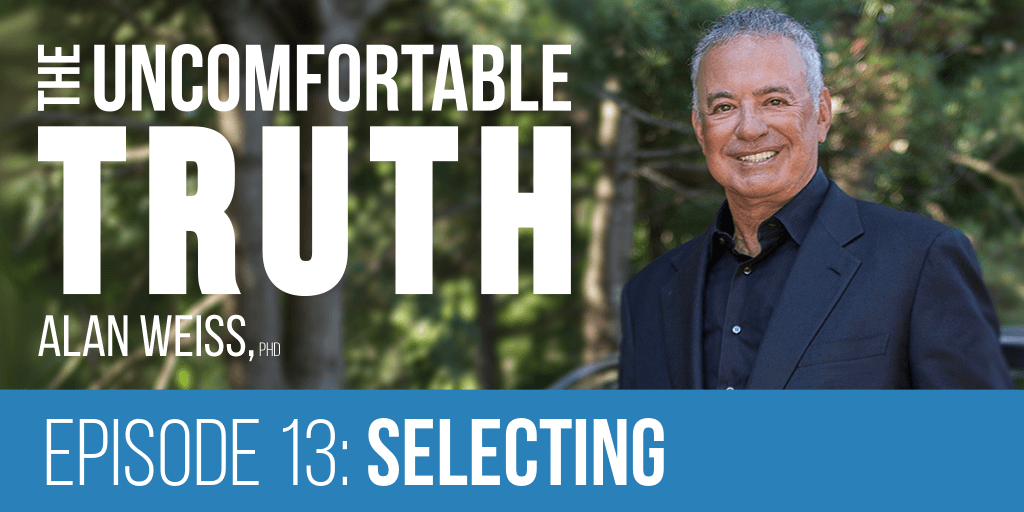
Episode 13: Selecting
“We “settle” instead of deliberately choosing what's best for us, and we need to stop that.”
Transcript:
Hi, I'm Alan Weiss, This is The Uncomfortable Truth, and this broadcast is on selecting.
There used to be a slogan used by Barneys in New York, the very famous clothing store, and they said, “Select, don't settle.” I liked that.
I didn't quite know why – but today I do.
We often settle every day instead of selecting. We often hear the admonition that the call we're on is being recorded for quality purposes or for training reasons. A lot of time though, I actually ask the agent on the other end “Is this call recorded?” and when she or he says “Why?” I'll say, “Because, let's be very clear, you've been very impolite, and very unhelpful and I hope somebody uses this for training purposes.”
You go to a store, a supermarket, hardware store, newsstand, and the clerks, who are sometimes extraordinarily indifferent, will put in your hand your receipt, your bills and coins in change, all at one time. And you're supposed to manage all that while getting out of the way of the next person in line, instead of handing these things to you sequentially – so you can properly put them away.
Let me have the bills first, put the receipt in the bag and then the coins last. When I ask people at CVS sometimes — the huge drug place, a Fortune 500 drug firm, that's headquartered here in Rhode Island — to put the receipt in the bag, they look at me like I've asked them to go above and beyond their pay grade.
A flight attendant tells me once on American Airlines, “We don't serve drinks on the ground.” I'm sitting in first class. I said to her, “Well, be careful about your pronouns. You don't serve drinks on the ground, but my last six trips on this route had people who did serve drinks on the ground, and it's airline policy to offer people drinks on the ground. So if you choose not to, say ‘I don't choose to,' so I can properly report your behavior.”
“Our rules are for your protection.” I love that one. It's very popular with banks. I mean, basically when banks deny your credit card because you've traveled out of the country, or just sometimes traveled into the next state, they're telling you it's for your own protection. It's not. It's because legally, you are only liable for the first $50 of charges incurred on a stolen card. And the banks, to cover their rear ends, want to make sure that no purchases made are illegal because they'd have to eat it, and consequently, they deny a customer the ability to make a charge, to err on the wrong side – in their favor.
I remember, I was in Bora Bora, and I had gone there through Figi. I changed from Air France to Air Tahiti. I was told in Bora Bora by American Express that they wanted to check on some charges that had been made because they seemed odd. I said “Don't worry, I'm in French Polynesia.” And they said, “Yes, but the charges are from Brazil.” And I said, “What?” The charges were for $175 for a toaster and similar items, in an apparent attempt not to draw attention.
What had happened is when I paid for our excess baggage (which was free on Air France but not on Air Tahiti) somebody at that counter stole the credit card number, and passed it on to someone who passed it on to someone else, who sold it to someone, who used it in Brazil. But American Express didn't deny my charges in Bora Bora, they simply checked on what they suspected was illegitimate use.
And guess what? They offered to FedEx me a new card the next day in Bora Bora. I told them not to worry, I had other cards, it could wait until I got home. But, that's the way you handle people. They select, they don't settle. I select American Express, I don't settle. And by the way, that's why they say, “Membership has it's privileges.”
The rules are never for your own protection. You know, I'd like to waive the protection. There's a bank here in Rhode Island, Citizens Bank, where if I want to send a wire transfer, it takes up to four or five business days. In an age of electronic banking, it takes four or five business days to get or receive a wire transfer. You could do it faster with a paper check that you walk to its destination. But this is for my protection.
One of the reasons I changed all my investments from Citizens Bank to TD Bank, and we're talking a lot of money, was that Citizens insisted that I come into the office, sit down with a manager in the local branch, fill out the wire forms on the computer there, and then confirm everything while the manager called his or her own back office to go over everything again. You told them on the phone what you wrote on the computer. TD Bank where I went, doesn't have to do that. They send me a form, I fill it out, and I scan it, and send it back or fax to them, and they take care of everything else.
In restaurants, we ask for menu exceptions all the time. In a good restaurant, that's not overly pretentious, and doesn't have a chef who believes that he or she walks on water, will grant you exceptions. “Sorry, sir, you can't have asparagus with the burger, we only provide fries with the burger.” What is that, written in stone somewhere? Good restaurants will gladly grant you exceptions.
Well, why not elsewhere? You know, your phone bill will provide you with the opportunity for much better rates if you take a look at it and simply make a call. The phone company doesn't offer it. They don't audit customers to give them better rates. They will audit customers to find out if they can sell them more. But if you ask, somebody will almost always get a better rate for you in your existing plan, because they're afraid that you'll go to the omnipresent competition.
So will cable and satellite services, by the way. If you ask the hotel desk clerk for an upgrade, in my experience, you'll get about a 30% success rate. Now, when I say my experience, that's not me. I'm paying for good rooms and big suites, but I know a lot of people who do this. And I've talked to them about it, and all they do is ask for it. And when they ask for it, about a third of the time they get it. The desk clerk can make that determination.
Don't negotiate, just ask, you'll be surprised what you can get. The worse case you get is a no. So, who cares if you get a no? You're no worse off than when you started. This is about selecting and not settling. I've seen people occupy the most horrible seats in restaurants, even though the restaurant wasn't all that crowded. I've seen people sent to horrible rooms in hotels, even though better ones are available. That's because they settle for whatever they're told.
There's a restaurant we used to go. We don't go to anymore because three times in a row, the hostess said, “May I seat you at one of our high tops?” The high tops were not attractive and they weren't comfortable. I said, “No, we'll take one of the booths.” She said, “Okay.” I finally said on the third occasion, “Why is it you always ask a customer to sit at the high tops, when they're the least desirable tables?” She said, “Because since no one likes them, we always try to sit people there first so we can fill them up.” In other words, don't change the high tops, or change your seating so that all your seats are comfortable. Try to stick some customers with what everyone knows are the worst seats. Brilliant.
But you know, we tend to settle on housing, on education, on professional services, on clothing, even on careers. If you think about it, we settle too much for this stuff. How many women are walking around in shoes that hurt them? They settle for them because they're in style or they can't get a size that fits them because the store doesn't stock that many sizes. You see people all the time with poor choices in clothing or haircuts because they're settling. And it's not really a matter of money. They're just not taking the time to select more carefully.
Now, strap on your seatbelt here, but that could be one reason that divorce rates are so high. And divorce rates are pretty high, and in fact, second-marriage divorce rates are worse than first marriages. And guess again, third marriage divorce rates are worse than second marriage. We keep marrying the same kind of person. That's why. We don't improve. But a lot of times in marriage, in partners, we settle we don't select.
And you can see that in these dating sites. You can see it in the eHarmonys, and in this date and that date. People are just settling for whomever they can get. A lot of women in New York have told me, among other large cities, but especially in New York, to my amazement, that it's very hard to find eligible men. And they say the men they do find who are attractive and eligible, are either married or gay. It's very hard to find the kind of man that they're really looking for, and so they wind up settling. They don't select. And that's the guy they go home with, and that's a shame.
It's why our tax returns and our legal work is often inept and inefficient. We've settled for our cousin Bruce's firm. We've settled for the firm that someone recommended to us. We've settled for the firm that happens to be around the corner. We've settled for the firm that has a quick opening. But what we need is excellent legal work and excellent accounting work, just like we need (one would hope) excellent medical work. Do you settle for a doctor? I mean if you're going to comparison shop for automobiles, or comparison shop vacation sites, wouldn't you comparison shop for the best possible surgeon or diagnostician? I certainly would. And, why wouldn't that also apply to schools, or the law, or finances?
It's why we're happy in our work, those of us who are happy in our work. It's because we've selected and not settled. It's because we've chosen work ourselves that we love and we're great at. That's far from settling. That's a choice. That's selecting. It's why we often feel trapped where we live, because we've settled for where we live. We haven't selected where we lived. This is a big country, and we got a lot of selecting we can do. But people settle for being close to their parents, or settle for being close to where they were raised, or settle for where their job took them, and that's where they stay.
It's why we don't feel good about ourselves because we settle for too much in our lives. From the way we look, to the way we're educated, to where we live. And when we settle, we sink. When you've settled – you sink into the ground. Somewhat like quicksand, or The La Brea Tar Pits, and all those dinosaurs caught from 100 million years ago, their bones still preserved, or those mosquitoes in amber. We sink until we cannot extricate ourselves any longer. We become trapped. And when we become trapped, we give up.
So, what I'm telling you here, the uncommon truth is, that settling eventually traps us. And it traps us in places we would never, ever choose to be for ourselves. But settling is a mindset. And if you settle at the retail level, you'll settle at the life level. If you'll settle for anything you're sold over the counter without asking for something better, without asking for something to be tailored. Without asking for something to be altered, or changed, or substituted, then you'll settle as well in life. And when you settle in life, that sinking feeling sets in. You need confidence and assertiveness to overcome this tendency. You're self-absorbed if you feel the need to be treated specially. But you're not self-absorbed if you just feel the need to be treated well.
I was at a convention once for the National Speaker Association. I had a group of about 400 people I was about to address, and the room was not supported. There was no one there to help with the AV, there was no one there to help with the site lines, and so forth. I went and got one of the administrative people from the National Speakers Association, and she says, “There's not enough of us to go around.” And so we can't support every room. I said, but I have 400 people. Much larger than most of the other rooms, and it needs to be supported. It needs adjustment.
And she said, “You shouldn't expect to be treated specially.” And I said, “I don't expect to be treated specially, I expect to be treated professionally.” Self-absorption is when you expect special treatment. But just expecting to be treated well and fairly, that's not self-absorption, that's just intelligence. That's selecting – not settling.
If the food isn't good, you return it. If the wine isn't good, you return it. If the clothes don't fit, you return them. If the school's not doing it's job, you move your kids. If the treatment isn't good, reject it. Don't settle for it. The biggest mistake we make is settling and not selecting, and it's entirely within our control. So, whether you sink in the sand or swim in the ocean, that's up to you.
If you get the chance, visit my website, AlanWeiss.com, and you can purchase my new book written with Marshall Goldsmith, Lifestorming. You can also sign up for my very exciting global live stream series, where you can actually ask me questions from your computer at your home while I'm providing information on such topics as abundance thinking and innovation.
Thank you for being with me. I will talk to you next time.






